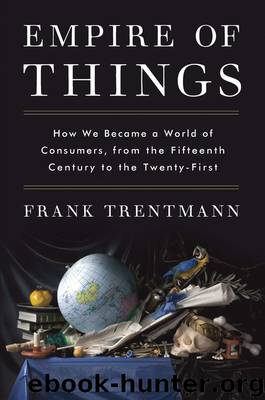Empire of Things: How We Became a World of Consumers, from the Fifteenth Century to the Twenty-First by Frank Trentmann

Author:Frank Trentmann
Language: eng
Format: mobi
ISBN: 9780062456335
Publisher: HarperCollins
Published: 2016-03-28T14:00:00+00:00
‘Work hard, play hard’ was already a motto in the United States in the 1950s. The cult of busyness in professional and corporate life since has energized leisure further, in the United States but in parts of Europe, too. There is evidence that it has significantly widened the leisure gap between the classes. For all its bad reputation, TV was a radical democratizing force in the early years. By 1970, most households in developed capitalist and socialist societies owned a set and spent around the same time in front of it watching more or less the same programmes. In France in 1974, viewers with a university degree or diploma watched fifty-four minutes a day on average, just twenty minutes less than early school-leavers. Twenty-five years on, the latter watched over two hours a day while graduates watched just half as much.84 That widening gulf speaks volumes about the polarization of leisure. For the educated, less time in front of the box meant more time in the theatre, museum and the gym, as well as more games on the computer.85 Not every doctor or author is active, of course. We must be careful not to imagine an absolute divide between active professionals and passive workers. Even in France, half the professional elite has never set foot in an opera house, a symphony hall or been to a pop concert, although most have been to the theatre. We are dealing with active elements, but in some classes these are bigger than in others. Only a tiny minority of skilled workers ever found their way to any of these venues, and in the case of classical concerts it has been steadily shrinking; they could just as well be farmers.86
The polarization of work and leisure in affluent societies in the late twentieth century, then, involves two divides that cut across each other. One is about quantity and the allocation of time between work and leisure. Highly educated professionals are the new working class – with longer hours in the office and less leisure outside it; ordinary workers the new leisure class. Running across this is a second, equally important divide over the quality of leisure time. Educated professionals may have less free time but they squeeze the most out of it, juggling a far larger number of frequently changing activities than those without qualifications.87 Their leisure pattern mimics their work life. As the masses gained leisure and holidays in the sun, idle conspicuous consumption lost some of its charm for the elite. The privileged few now raised their game, seeking refuge and distinction in more demanding activity holidays, cultural tours and personal-fitness regimes. Climbing up Mount Kilimanjaro replaced lazy days on the Riviera. Since their hyper-activism consists of especially time-intensive activities that involve going out, extra mobility and coordination, it is, perhaps, only fair that these are also the very groups that feel most rushed. Fitting it all into twenty-four hours is not easy.
In the final analysis, ‘time poverty’ is about the quality of leisure, not its quantity.
Download
This site does not store any files on its server. We only index and link to content provided by other sites. Please contact the content providers to delete copyright contents if any and email us, we'll remove relevant links or contents immediately.
| Africa | Americas |
| Arctic & Antarctica | Asia |
| Australia & Oceania | Europe |
| Middle East | Russia |
| United States | World |
| Ancient Civilizations | Military |
| Historical Study & Educational Resources |
Underground: A Human History of the Worlds Beneath Our Feet by Will Hunt(12090)
Sapiens by Yuval Noah Harari(5366)
Navigation and Map Reading by K Andrew(5151)
The Sympathizer by Viet Thanh Nguyen(4385)
Barron's AP Biology by Goldberg M.S. Deborah T(4148)
5 Steps to a 5 AP U.S. History, 2010-2011 Edition (5 Steps to a 5 on the Advanced Placement Examinations Series) by Armstrong Stephen(3727)
Three Women by Lisa Taddeo(3425)
Water by Ian Miller(3179)
The Comedians: Drunks, Thieves, Scoundrels, and the History of American Comedy by Nesteroff Kliph(3073)
Drugs Unlimited by Mike Power(2591)
A Short History of Drunkenness by Forsyth Mark(2291)
DarkMarket by Misha Glenny(2207)
The House of Government by Slezkine Yuri(2200)
And the Band Played On by Randy Shilts(2199)
The Library Book by Susan Orlean(2064)
Revived (Cat Patrick) by Cat Patrick(1987)
The Woman Who Smashed Codes by Jason Fagone(1970)
The Absolutely True Diary of a Part-Time Indian by Sherman Alexie(1909)
Birth by Tina Cassidy(1903)
